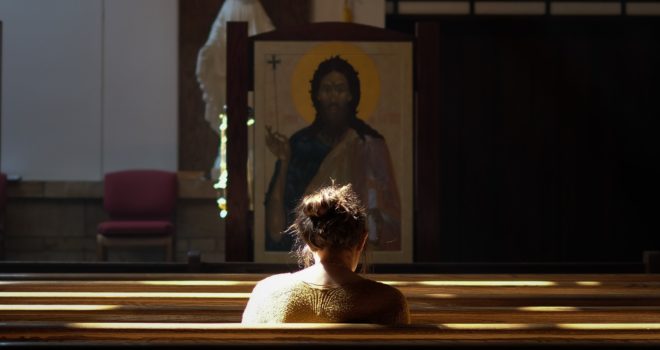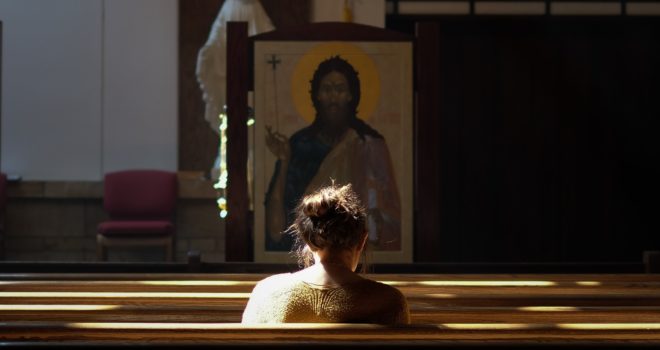The aim and purpose for this essay will be to persuade the reader of his or her need for Christ, His Church, and the Eucharist beginning with a teaching on the successive quality of nations. Jesus taught: Nation will rise against nation, and kingdom against kingdom (Lk. 21:10) which doesn’t necessarily mean the end. It simply points to how this world and the things of this world are passing as a result of Christ’s resurrection. After the resurrection time and history are forever looking ahead and anticipating “a new heaven and a new earth” (2 Pt. 3:13). The resurrection is the root and foundation of the Catholic Church.
There are two terms for the Church in Latin. The first is societas referring to the Catholic Church as a visible “society.” This is the outer visible dimension governed by canon law, a divinely instituted hierarchy, and a variety of visible, organizational structures primarily aimed at mediating the grace of Christ. The second term is communio or “communion” which is the inner, spiritual nature the Church mediates. St. Therese of Lisieux discovered this inner spiritual communion when she declared in Story of a Soul: “In the heart of the Church, my mother, I will be LOVE!” Pope St. John Paul II wrote in Ecclesia de Eucharistia (2003) that the “Church draws her life from the Eucharist” (#1). The Eucharist makes the Church. We commonly refer to the Eucharist as “holy communion” which is spiritual communion laid down by Christ in time. By way of this spiritual communion on earth we share in the eternal communion of Father, Son, and Holy Spirit as the Second Vatican Council taught in Lumen Gentium (#4): “Thus, the Church has been seen as ‘a people made one with the unity of the Father, the Son and the Holy Spirit.’”
On our own we cannot get to “forever” but God promised to get us there in sending us His Son, Jesus Christ. Christ is our Savior. How does He save us? He incorporates us into the Church which is “holy communion.” We are initiated into it at Baptism and the Eucharist makes it. At Mass we are received into “holy communion,” the same communion in which the saints now participate in heaven.
There are many ways to conceive our need for Christ and His Church but here we’ll begin from experience. We’ve all likely experienced what could be called feedback loops. They are common on social media and the young are particularly vulnerable to them. They tap into social media for feedback. Who is popular? Who’s being trashed? “I don’t want to associate with someone if they’re unpopular.” That’s a feedback loop, a self-referential loop by which we encounter feedback that interprets us and informs our behavior toward others.
Another example is the rather casual feedback loop of men and women entering the bridal chamber outside of marriage. Once the threshold is crossed, they never see each other the same way again. Instead, they become triggered by the feedback loop which gains momentum based on previous experience. Today it’s a real possibility that Christ wouldn’t enter this situation. A real case scenario might be one of a non-practicing Catholic Christian who frequented the bridal chamber outside of marriage, finished university, and eventually married. He grows to be 30 or 33 and meets someone new at work who is not his wife. He becomes triggered. The feedback loop is still there and if the other person gets into it with him, they may trail off into adultery. It can seem so romantic and beautiful, and yet two families are being destroyed. Without Christ these loops can become so bad that an addiction can result. Addiction is an extreme case, but these loops are destructive which leads to a truth we’ve known a long time in the Catholic Church, namely, once a person becomes ensnared in a feedback loop of sin, he or she is powerless to get out.
Only Jesus Christ, the Son of the living God, who destroyed sin and death on the cross can free us from these loops of sin and our path to Him is our ongoing membership in the Church. The Church means salvation for us because the horizons of “holy communion” are eternal, opening up to God. One doesn’t come into that broader horizon with a feedback loop and make it conform to oneself. We either die and partake of the broader horizon or stay separated. The horizons of “holy communion” are so open that it can’t be closed into a feedback loop. The cross of Christ opens us up into fuller communion with the Church which is a share in the eternity of God (2 Pt. 1:4). We are broken open like the seed falling to the ground, dying and bearing much fruit (see John 12:24ff).
Yet today so many are wandering about bound up in these feedback loops which enshrine us at the center of the created universe. What does Jesus do? Like the Good Samaritan He pours oil into our wounds, takes us to the Inn, posits a couple of coins, and says, “I’ll give you more on my way back” (see Luke 10:30-35). He entrusts us to the Church which is “holy communion.”
The Church is a visible “society” which adapts to “rerum novarum” or “new things” as She journeys through time. These adaptations, however, cannot alter the heart of the Church which is a share in the indestructible communion of Father, Son, and Holy Spirit laid down by Christ in time. In these days it may be hard to believe these truths, particularly amid recent reports of clergy sex abuse. But even a dirty bar of soap retains its agency for cleansing and the dirt doesn’t belong essentially to the soap. For this reason not only would a revival of faith in Christ, His Church, and the Eucharist be advisable but most beneficial, not only for the Church, but also culture and society.
✠













